Sony NEX-5n Review
Sony NEX-5n
Sony's NEX-5n offers all the power and poise of a DSLR, only in a much smaller package
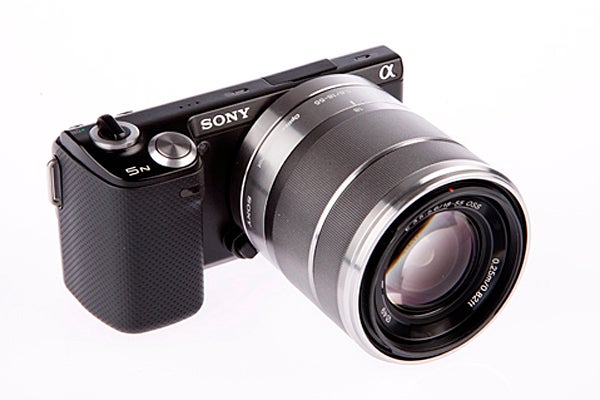
Verdict
Pros
- Class-leading image quality
- Excellent noise control at mid to high ISO settings
- Impressive Full HD movie recording abilities
- Small and portable, but also very well built
Cons
- Lack of physical buttons
- In-camera menu is still a little clunky
Key Specifications
- Review Price: £510.00
- 16.2MP APS-C Exmor CMOS sensor
- Sony BIONZ image processor
- ISO 100 - 25,600
- 1080/50p Full HD AVCHD movie recording
- 6x Creative Style processing options
- 11x Picture Effect digital effects filters
For a second opinion check out the video review on our sister site WhatDigitalCamera.com
While the exterior design and overall dimensions remain virtually unchanged, the NEX-5n does enjoy quite a few hardware and specification upgrades over the NEX-5. Internally, the biggest change is the new APS-C CMOS sensor, which brings with it an increase in effective resolution to 16.1MP (from 14.2MP).
Sensitivity has received a boost too, with the NEX-5n able to offer a maximum setting of ISO 25,600 (compared to 12,800 on its predecessor). Continuous shooting speed also rises to a maximum 10fps (7fps on the NEX-5). The newer model also benefits from a bespoke Accessory Port hotshoe that (unlike its predecessor) allows the NEX-5n to accommodate Sony’s optional FDA-EV1s, 2.3million-dot electronic viewfinder, among other accessories.
In addition, the NEX-5n also offers 1080p Full HD video recording at 30fps and a 3inch 921k-dot touchscreen LCD that’s mounted on a two-way bracket that allows for upwards and downwards tilting – for easier overhead and waist-level photography – but no sideways adjustment unlike the Panasonic G3 for instance. As well as allowing for easier browsing of your snaps, the touchscreen greatly enhances manual control over the camera – with only one adjustment dial this makes a big difference, and it’s something the NEX-5 lacked. Rounding things off is the usual array of Picture Effect and Creative Style image-shaping and digital filter effect tools, along with Sony’s excellent Panorama Sweep technology.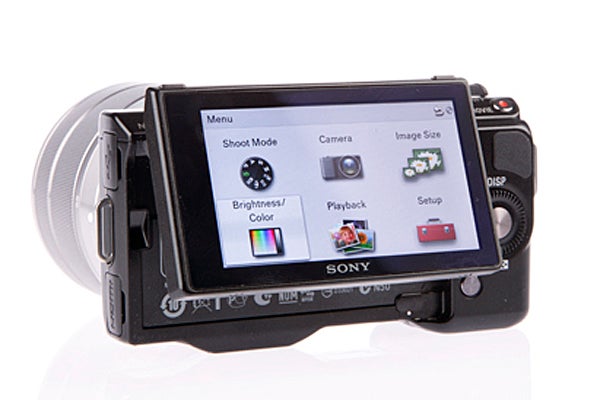
Does this all gel together to make the Sony NEX-5n its best compact system model yet, or are you better off with one of its main rivals? Something like the Samsung NX200, Olympus EPL-3 for example, or perhaps the Panasonic Lumix GX1 or Nikon J1?
Also, given that the NEX-5n also commands a fairly hefty price premium over its older but still widely available stablemates, the Sony NEX-5 and Sony NEX-C3, does it pack enough to justify the extra expenditure?
Let’s take a closer look and find out…
The Sony NEX-5n is built around a 23.5 x 15.6mm APS-C Exmor CMOS sensor that produces an effective resolution of 16.1MP. At maximum resolution in the default 3:2 aspect this equates to a maximum output of 4,912 x 3,264 pixels. In addition, it’s also possible to record images at 8.4MP (Medium) and 4MP (Small). Alternative shooting aspects are restricted to just 16:9 however, so if you want to give your images a 4:3 or 1:1 look you’ll have to crop them accordingly on a computer.
There are two levels of JPEG quality – Fine and Standard – along with the option to record lossless Raw (Sony .ARW) files. Sensitivity, meanwhile, extends from ISO 100 up to ISO 25,600 with the NEX-5n able to shoot full-resolution JPEGs (and Raw) throughout the entire ISO range. Given the NEX-5n’s compact-like dimensions there’s no space for a built-in, pop-up flash, although a dedicated (albeit slightly plasticky) flash unit is supplied in the box that attaches to the NEX-5n’s proprietary Accessory Port hotshoe.
The NEX-5n further benefits from Sony’s current generation of BIONZ image processor, enabling it to crunch its way through data at a fair old pace with up to 10fps available in Speed Priority Continuous mode (whereby the AF and metering functions are only active for the first frame of the sequence) or 3fps with the AF constantly active in regular Continuous mode.
Shooting modes extend to the regular quartet of Program, Aperture-priority, Shutter-priority and Manual, and these are neatly supplemented by a point-and-shoot Intelligent Auto mode, eight individually selectable Scene modes, an Anti Motion Blur mode, a 3D mode and, last but not least, a Sweep Panorama mode that enables the easy creation of ultra-wideangle images with a single button press. Sadly, this last option doesn’t include the high-resolution option seen on other Sony models, such as the HX9V.
The NEX-5n offers the usual array of Creative Style image processing options and Picture Effect digital filters, which variously allow you to alter the contrast, saturation and sharpness levels of your JPEGs or to give them a miniaturisation or toy camera look. These are supplemented by five levels of D-Range Optimiser control for more even exposures in high-contrast scenes and an automatic HDR tool that automatically shoots three images at a user-defined EV differential of up to 6EV before blending them into a single image.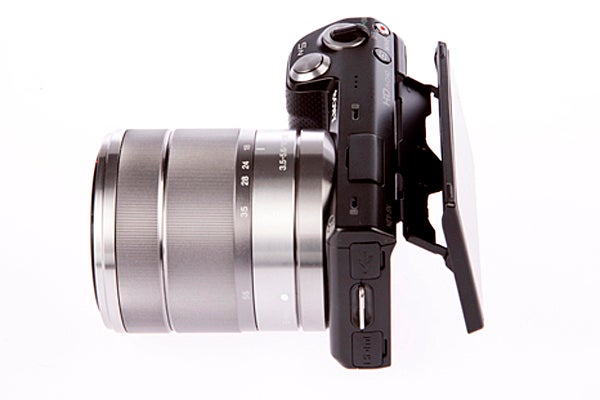
Movie recording abilities extend to a maximum 1,920 x 1,080/50p Full HD with further options to record 1,080/50i and 1,080/25p AVCHD movies at a choice of 24 and 17mbps, or indeed MP4-encoded movies at non-HD resolutions. While the degree of choice and technical capabilities on offer are certainly impressive, we can’t help but think that many consumers will find the sheer number of options and the way they are presented somewhat confusing.
As with other Sony NEX models we’ve reviewed, overall build quality is pretty high, with the NEX-5n benefiting from a predominantly metal body and a general sense of solidity. This premium feel is further enhanced by Sony’s dedicated E-mount range of lenses, which again are treated to a metal finish.
The finger grip is only really big enough for two fingers and the squared off, relatively low profile design encourages these fingers to sit at a slight angle rather than square to the camera. In use, this works quite well offering a grip that’s both secure and reasonably comfortable, while positioning the camera in the hand at an angle that’s conducive to using it at or around eye-level. It’s definitely not as nice to handle as a full size SLR or larger CSCs with deeper grips, but is nicer than many of the even slimmer CSCs that feature hardly any grip at all.
Size-wise, the NEX-5n is one of the smallest APS-C equipped compact system bodies on the market – noticeably smaller than the Samsung NX200 we recently reviewed. Indeed, the compact-sized dimensions of the NEX-5n even hold up quite well against its Micro Four Thirds and Nikon CX competitors as well – at least in terms of the actual camera body. 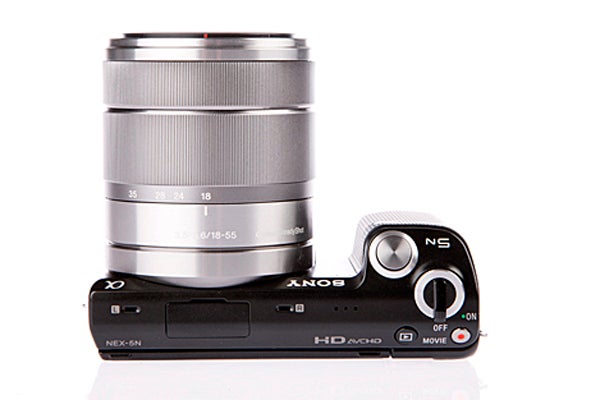
No, this isn’t a huge telephoto lens but the standard 18-55m kit zoom lens
However, when it comes to the matching Sony E-mount lenses, it’s a different matter. Of course it’s not so bad with the 16mm ‘pancake’ prime attached, but with the 18-55mm kit zoom on the front the NEX-5n’s compact-sized body can look and feel a bit unbalanced. If this doesn’t bother however, and you already own a Sony DSLR then the good news is that you can also fit regular A-mount DSLR lenses to the NEX-5n via an optional LA-EA2 converter (c.£300).
The 3in monitor produces rich colours, deep blacks and pin-sharp images in both composition and playback modes. However, it is worth noting that the 16:9 dimensions of the screen mean that regular still images shot at 3:2 don’t fill the whole screen and can therefore look a little small.
The Sony NEX-5n uses a 25-point contrast-detect AF system and, in addition to regular autofocus (in either Single-shot or Continuous mode), there’s also a Manual Focus option that employs a helpful MF Assist function to magnify whatever’s inside the focus box to screen-filling proportions for more precise results. Last but not least is a DMF focus mode which keeps the autofocus switched on but also allows you to fine-tune the camera’s results manually using the focus ring on the lens (albeit without any help from AF Assist).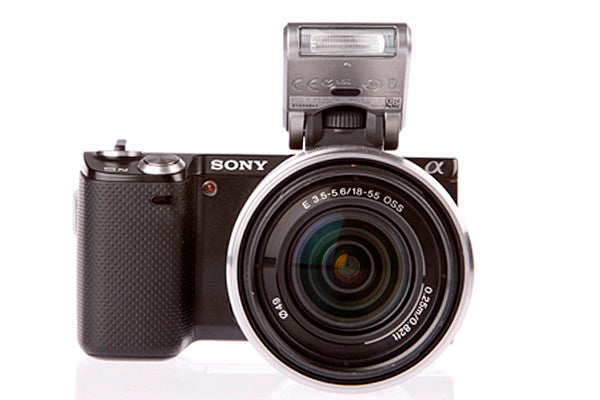
With the AF switched on, point-of-focus options extend to Multiple (determined by the camera) and Central, along with a Flexible Spot setting that allows you to move a single AF box around the screen as you wish with excellent screen-wide coverage offering plenty of scope for creative focusing. Our only minor gripe is that there’s no way to switch between these point-of-focus options quickly without having to trawl through the in-camera menu.
In terms of AF speed, the NEX-5n isn’t the fastest we’ve seen on a camera of this type and is certainly slower than rival CSC models from the likes of Nikon, Olympus and Panasonic. That said, we’re only really talking small margins here (mere hundredths of seconds) and the NEX-5n’s AF speed remains perfectly serviceable, especially in good light. There’s also a powerful little AF Assist light on the front of the camera that can help out when light levels drop too low.
In other areas the Sony NEX-5n’s general performance stacks up pretty well. Flicking the main on/off switch the camera springs to life almost instantly, gaining focus and being ready to shoot in a fraction over two seconds. Processing times between shots are pretty quick too; using the Nex-5n in Single-shot drive mode we were able to shoot full-res/fine-quality JPEGs at a rate of about one a second, with no upper limit on the number of consecutive shots. Shooting in Raw, we were still able to reel off about eight shots inside ten seconds, while in Raw JPEG we managed seven shots inside ten seconds.
Using the camera in its standard Continuous drive mode we were able to shoot 60 full-res/Fine-quality JPEGs in a twenty second burst with no discernable slowdown occurring. Taking our finger off the shutter button, it took only a second or two longer for the camera to process them all too. Switching to Raw, however, we found that the camera did begin to slow down quite considerably after about ten frames. In Raw JPEG, this fell even further to about five frames before the buffer filled. While the Speed Priority Continuous drive mode does indeed shoot at its claimed 10fps, it’s worth remembering that both focus and metering are locked to the first frame, which makes it less practical for shooting fast-moving subjects with.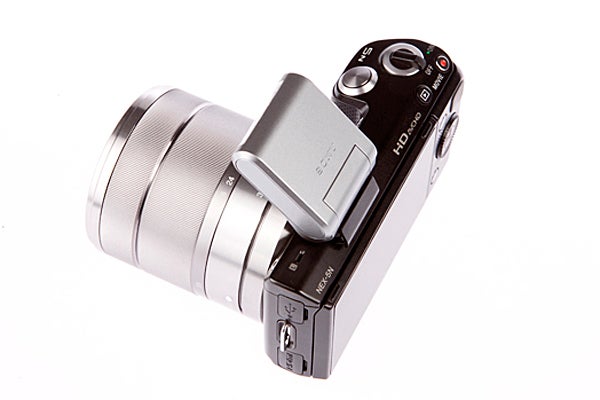
One criticism of previous Sony NEX models is that the lack of physical buttons combined with the less-than-intuitive layout of the in-camera menu can make them a bit awkward to use. To a certain extent this continues with the NEX-5n; you’ll certainly need to familiarise yourself with the quirks of which shooting settings are found inside the ‘Camera’ sub-menu (AF mode, Drive mode) and which are found inside the ‘Brightness/Colour’ sub-menu (Metering, ISO, White Balance). The NEX-5n would benefit hugely from having some kind of ‘Quick Menu’ that could provide direct access – preferably via a dedicated physical button – to the most regularly used shooting settings.
While the NEX-5n is presented as a camera that’s easy to operate, it does take some getting used to before you know instinctively where to find things. Thankfully, these navigation quirks are mitigated somewhat by the NEX-5n’s touch-screen control, which proves pleasingly responsive and easy enough to use despite the fact that the on-screen virtual buttons are a little on the small side. We also like how the NEX-5n offers the ability to assign user-defined functions to the right D-pad key and the two soft function keys.
Image quality pretty much leads the field within the compact system market, with the benefits of the large Sony-made APS-C sensor clearly visible. Low-light shooting is especially impressive with noise kept to a minimum all the way up to ISO 3,200 (and often ISO 6,400). Even the top sensitivity settings of ISO 12,800 and (to a lesser extent) 25,600 aren’t a complete disaster area. 
Metering is handled via a 1,200-zone module and proves to be consistently reliable, with just the slightest tendency to underexpose when set to evaluative mode and faced with a high-contrast scene along the lines of bright skies and dark shadows – nothing that a dab of EV compensation (of which /-3EV is available) cannot cure though.
Colour and tonality are, of course, affected by the choice of Creative Style being used. For the vast majority of our time we were out shooting with the NEX-5n we tended to stick with the Standard setting as we found it produced pleasing results with plenty of punch but without the overly saturated tones of the Vivid setting. There are, of course, situations where the other Creative Style (and Picture Effect) settings will come in handy, for example helping to give a scenic image a bit of extra lift on a flat, grey day.
Verdict
The Sony NEX-5n is a worthy addition to the company’s growing range of compact system cameras. Those looking for a small, portable and well-built CSC with the image quality benefits of an APS-C sensor will find the little NEX-5n ticks all the right boxes. While we still have some reservations over the lack of physical buttons and the slightly awkward in-camera menu, the addition of touch-screen control and custom key settings does help to speed operation up considerably. Of course, for many prospective buyers the big question will be image quality and here we can report that the NEX-5n delivers class-leading results.

The ISO test scene in full and at ISO 100

As this 100% crop shows ISO 100 is clean, sharp and free of noise with plenty of shadow detail.

ISO 200 shows no discernible difference from ISO 100.

ISO 400 there’s the merest hint of softening in shadows, but nothing to really worry about.

By ISO 800 this softening in shadow areas continues, but again it’s not really doing the image any harm.

At ISO 1600 noise has become visible, although it’s only really noticeable at 100% and above.

ISO 3200 is the tipping point – where image noise and the softening effects of noise reduction begin to become noticeable. Overall quality at smaller image sizes is still very good though.

Image noise has become much more prominent at ISO 6400, although images remain usable at smaller sizes.

Moving towards the top of the sensitivity range, ISO 12,800 shows a marked decline in quality.

The top setting of ISO 25,600 is really only for use in emergencies.
Of course, there’s only so much 100% crops shot under studio conditions can show, so here’s a real-life scene shot at different ISOs.

ISO 100 (for comparison)

ISO 1600

ISO 3200

ISO 6400

ISO 12,800

ISO 25,600

1/60sec @ f/5, 30mm, ISO 500, AWB

1/60sec @ f/5, 30mm, ISO 1250, AWB

1/125sec @ f/3.5, 24mm, ISO 400, AWB

1/80sec @ f/3.5, 24mm, ISO 800, AWB

1/100sec @ f/4, 35mm, ISO 400, AWB

1/60sec @ f/5.6, 24mm, ISO 400, AWB

1/100sec @ f/4, 24mm, ISO 500, AWB

1/60sec @ f4, 46mm, ISO 320, AWB

1/200sec @ f/3.5, 24mm, ISO 400, AWB
Trusted Score
Score in detail
-
Value 8
-
Design & Features 9
-
Image Quality 9
-
Build Quality 9

